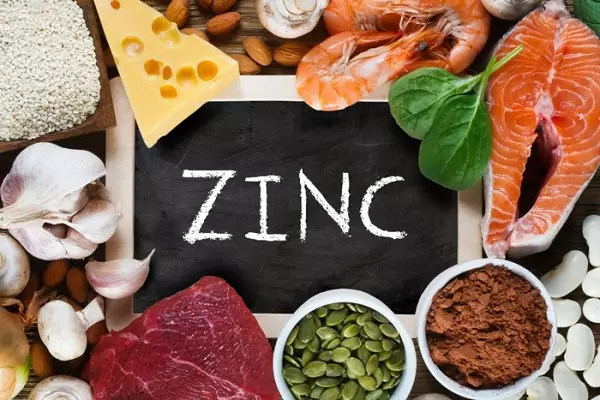Excess of zinc – when can it occur and what are the symptoms?
 Zinc is a trace element that is present in every cell of the body. It conditions the course of numerous life processes, which means that both deficiency and excess of zinc might have a negative impact on health. The zinc deficiency is definitely more common, as this element is absorbed from the diet to a small degree. The excess on the other hand occurs incredibly rarely, and the cause is uncontrolled administration of high doses of zinc.
Zinc is a trace element that is present in every cell of the body. It conditions the course of numerous life processes, which means that both deficiency and excess of zinc might have a negative impact on health. The zinc deficiency is definitely more common, as this element is absorbed from the diet to a small degree. The excess on the other hand occurs incredibly rarely, and the cause is uncontrolled administration of high doses of zinc.
Zinc – it is called the element of life for a reason
Zinc is a cofactor for about 300 enzymes, which means an impact on numerous metabolic processes of carbohydrates, proteins and lipids, as well as energy production processes or body detoxification. Zinc also makes part of superoxide dismutase – an enzyme with strong antioxidant action that effectively neutralizes free radicals.
Zinc supports functioning of the immune system, limiting the risk of getting numerous infections. Improving the functioning of the immune system and antioxidant activity of zinc cause its anti-cancer properties to be researched more and more, especially when it comes to prostate cancer.
Zinc is an element that is incredibly important for people at risk of diabetes or already suffering from this metabolic – hormonal disease. Zinc regulates the blood glucose level, minimizing the risk of developing insulin resistance and diabetes and supports the treatment of diabetes. This element also regulates the insulin secretion in the pancreas.
Another role of zinc is positive influence on development and functioning of the nervous system. During the fetal development period, zinc is essential for preventing intellectual disability, during the later periods of life it conditions proper neural conduction and mental capacity and also limits the risk of developing depression.
Another reason why it’s a good idea to take care of the right zinc supply is the positive impact of this element on the skin, hair and nails or regulating the sense of sight, taste or smell.
Zinc deficiency – more likely than its excess
Zinc is not an element that can be easily provided by the diet – the best proof of it is the fact that nearly 30% of the global population suffers from zinc deficiency. By analyzing nutritional value table, one can notice that zinc is present in a large number of food products. Why is the zinc deficiency so common, then? It is conditioned by a very limited absorption rate of zinc. Plenty of sources of zinc, such as grains, also contain phytic acid that blocks the absorption of zinc from the digestive tract nearly completely.
We need about 10 – 11 mg of zinc a day. Providing lower amounts of zinc results in developing zinc deficiency, which manifests itself through a lowered immunity, worse condition of skin, impaired sight, taste and smell, depression or the blood glucose level being too high. In order to prevent development of zinc deficiency – supplements are used. Is it possible to overdose zinc from supplements?
Zinc overdose – is it possible?
Excess of zinc in the body is very rare. The cause of overdosing zinc might be getting exposed to zinc compounds at work, as well as excessive zinc supplementation. The recommended daily dose of zinc is about 10 mg. If zinc overdose occurs, on the other hand, there might be severe or chronic poisoning.
Severe zinc poisoning arises from sudden administration of high doses of zinc and it manifests itself as follows:
– dizziness
– nausea and vomiting
– ulceration
– mucous membrane inflammations
– heartburn
– temperature
– anemia
The symptoms of zinc overdose during severe poisoning, on the other hand, are mostly liver failure accompanied by jaundice, fainting, dyspnea and stomach disorders.